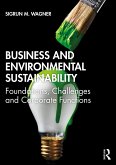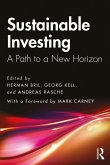The heightening impact of ecological and societal crises makes sustainability an increasingly urgent imperative, requiring a fundamental shift in how we understand and practice management and business.
In this book, the authors set out the key characteristics of sustainability such as its temporal and multilevel effects and highlight the complex array of sustainability risks and opportunities for business and management. Setting business within a systems perspective, the authors outline different sustainability discourses that frame how business responds to the sustainability imperative. They call for the normative and scientific approaches to sustainability to be merged so that a new transdisciplinary approach that brings together the material and relational traditions in sustainability management is developed. Sustainability work is understood as the reframing of tools, technologies, practices and business strategies to respond to the imperative. The book concludes by highlighting dynamic features of the imperative as it is shaped by the urgent need to restore and regenerate social and ecological systems. Sustainability transitions such as the Circular Economy and Net Zero are suggested as inspiration for profound business transformation.
By facing the intractable complexity associated with sustainability, this book challenges students and scholars to draw from across the sciences and social sciences to understand, reflect upon and deliver responsible business outcomes in contemporary society.
In this book, the authors set out the key characteristics of sustainability such as its temporal and multilevel effects and highlight the complex array of sustainability risks and opportunities for business and management. Setting business within a systems perspective, the authors outline different sustainability discourses that frame how business responds to the sustainability imperative. They call for the normative and scientific approaches to sustainability to be merged so that a new transdisciplinary approach that brings together the material and relational traditions in sustainability management is developed. Sustainability work is understood as the reframing of tools, technologies, practices and business strategies to respond to the imperative. The book concludes by highlighting dynamic features of the imperative as it is shaped by the urgent need to restore and regenerate social and ecological systems. Sustainability transitions such as the Circular Economy and Net Zero are suggested as inspiration for profound business transformation.
By facing the intractable complexity associated with sustainability, this book challenges students and scholars to draw from across the sciences and social sciences to understand, reflect upon and deliver responsible business outcomes in contemporary society.
"This comprehensive, wise book brings an important, holistic systems lens to sustainability and businesses. Its powerful message of reconnecting humans and businesses into and of nature should be read by leaders, scholars, and teachers everywhere." Sandra Waddock, Galligan Chair of Strategy and Professor of Management, Boston College, USA
"Managing sustainability has never been more necessary than now. But there are no simple solutions. This book provides excellent insight into the complexity of managing sustainability. It makes the reader aware of the need to embrace complexity to come up with effective solutions." Jonatan Pinkse, Professor of Strategy, Innovation and Entrepreneurship, University of Manchester, UK
"Benn, Edwards and Williams offer a compelling account of the unintended consequences of modernity, examining risks and opportunities for business and management. In so doing, they highlight insights from sustainability sciences and the humanities, which challenge accepted understandings of trade-offs between environmental, social and economic outcomes. This book provides researchers, teachers and managers with arguments for developing a systemic approach in grappling with sustainability." Susse Georg, Professor of Sustainable Innovation, University of Aalborg, Denmark
"Managing sustainability has never been more necessary than now. But there are no simple solutions. This book provides excellent insight into the complexity of managing sustainability. It makes the reader aware of the need to embrace complexity to come up with effective solutions." Jonatan Pinkse, Professor of Strategy, Innovation and Entrepreneurship, University of Manchester, UK
"Benn, Edwards and Williams offer a compelling account of the unintended consequences of modernity, examining risks and opportunities for business and management. In so doing, they highlight insights from sustainability sciences and the humanities, which challenge accepted understandings of trade-offs between environmental, social and economic outcomes. This book provides researchers, teachers and managers with arguments for developing a systemic approach in grappling with sustainability." Susse Georg, Professor of Sustainable Innovation, University of Aalborg, Denmark








